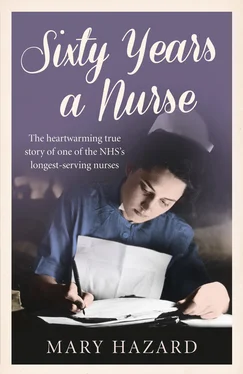In 1952, Putney took in about twenty new trainee nurses – mostly from Ireland, like me, but also from Holland, Germany, Hungary, Italy and England. There were strong unresolved post-war feelings and I’m sorry to say that racism abounded, unchecked. Matron, a small, intense woman called Miriam Sturgeon, said quite baldly to us that ‘I’ll take the Irish, because I need you, but I don’t have to take the coloureds.’ However, the Dutch would not sit down with the Germans, even if they were Jewish, and there was a hell of a lot of strife between them then, which I found quite bewildering at first. One of my first new trainee friends was a lovely Dutch girl called Hanse. She was nineteen and from Amsterdam, and she told me the most terrible story which explained her attitude towards the Germans. She said her family had been starving during the German occupation, and had had to beg, borrow or steal anything to eat. She had a twenty-year-old brother who would go out and forage for food, scavenging round the fields around Amsterdam or even dustbins. To disguise himself, he would put on one of Hanse’s dresses and a headscarf, and get on her sit-up-and-beg bike, and go and scrounge turnips from the fields for the family to eat.
Then one day he was actually stopped by a German soldier. The Nazi asked what ‘she’ was doing, then tried to rape Hanse’s brother, but when he discovered very quickly that ‘she’ was a boy, he shot him and left him in the gutter to die. As a consequence, Hanse would not sit down with the German nurses in the canteen, and hated being anywhere near them. She would stand up and eat, her back to the wall, and Sister would command, ‘Sit down, nurse,’ and Hanse would retort, saying, ‘No, Sister, I’m fine where I am.’ I’d be thinking, ‘ Oh, sweet Jesus, she’s in for it ,’ and I’d entreat her to sit down next to me. ‘I’m not sitting next to a verdammte Deutsche ,’ she’d spit. I didn’t really understand the depth of her feelings or the reasons for them then at all. I was so naïve back then. But Hanse would say, ‘You know, Mary, the Germans killed us in Holland, just because we were hungry, so I’m not sitting down.’ Another Dutch girl, Christe Lemm, would say, ‘I’m also not sitting down next to those Germans. You can’t make me,’ and would stand staunchly next to Hanse. Infuriated by this insubordination, Sister would stride off and get Matron, telling her there was a war still going on with the prelim nurses; Matron would then march back in, alongside Sister, and snap at the Dutch protesters, ‘Have you no dignity, girls? Sit down.’ Unperturbed, Hanse would say, ‘ Gott verdammt the lot of us.’ Matron would bark, ‘Well, you’ll all have to learn to rub along together. The war is over now.’ Indeed, on the wards she would not settle for anything else, despite Hanse’s and Christe’s painful feelings. We were told over and over we all had a job to do, and we had to get on and do it, regardless of any personal grudges or feelings. But the Dutch and the Germans were red rags to a bull, while the Irish were stuck in the middle with the English, for a change. For me, this was a real turn-up for the books.
My training as an SRN would take three years, with each year including three months of day duty, three months of night duty, and experience on specialist wards, such as tuberculosis (TB), which was rife at the time. I was also to do a three-month stint in theatre and I would have to do dreaded annual exams. For the first three months I was at school daily being trained, and then I ‘observed’ on the wards for a day a week. We were only unleashed on the wards, to do some basic or minor tasks with real patients, under the eagle-eyed gazes of staff nurses and sisters, after the first three months were completed satisfactorily.
Even then, once on the wards, a lot of my time was spent cleaning: swabbing, washing, scrubbing, wiping everything down scrupulously. There was an unrelenting fixation on cleanliness and disease prevention, so we disinfected and scrubbed everything in sight. It was second nature. One of my first jobs was cleaning a toilet, without a brush or rubber gloves, which was disgusting. I was crying all the time, and Sister snapped at me to ‘Stop blubbering and get on with it.’ I said, ‘My mother wouldn’t make me do this,’ and she said, ‘Well, tough, nurse. You’re not with your mother now, are you?’ My hands became raw from washing and scrubbing all the time, immersed in carbolic and disinfectant, but there was a zero tolerance to infection as little could be done, otherwise, to stop it spreading. We didn’t suffer from MRSA or C. Diff, which are the modern killers, but I’m convinced it’s because we were on our knees wiping down the beds, even the chair feet and bed wheels, cleaning taps, washing down walls, even light switches, door knobs and bed springs, night and day.
Men and women were segregated into separate wards back then, and there were two main categories: medical (which was general and covered lots of things) and surgical. Each long, rectangular ward had up to thirty patients each, in beds down the sides, with the nurse’s table at the double door end. There was usually a table for mobile patients to eat at down the middle of the room. The floors were wooden, and scrubbed constantly. There was a little side kitchen, where the nurses could make tea and toast, or squash, or fill vases and jugs with water. Also, there were balconies with iron railings outside the windows, and ‘isolation’ patients would be pushed out there in their beds to get fresh air (in which there was a great curative belief) during the day. There were a few side rooms for extremely ill or even private paying patients. Then, off the ward, there was the huge sluice, a big tiled room with huge sinks, for the metal bedpans and men’s glass wee bottles to be washed and disinfected in. We also did diabetic urine testing there.
The women’s medical ward, Corry, had patients in together with all sorts of different conditions from broken femurs with patients strung up on huge metal traction frames, to appendectomies, tonsillectomies (which were popular then), stomach ulcers and even women being treated for failed abortions. I was really amazed to see these poor women, of all ages, both married and single (which was shocking then), in with everyone else. Sister would ‘tut tut’ all the time, showing she did not approve of them, and they could be ostracised. Some of them came in in a terrible state, it was so cruel to see, with metal back-street abortion implements still stuck in them. But they got no kind words from Sister, no arm round the shoulder: she disapproved and she didn’t mind showing it. They’d be given Ergometrine, a drug to put them in labour, and they suffered dreadfully, poor things.
Then we would be told to swab the women down with Dettol, and we’d have to shave them ‘down there’. I’d never seen anything like this at all. The poor, bleak women would be rolled away to have a ‘scrape’ in theatre and then shoved back out by a very snooty Sister, as soon as she could discharge them. Then their ‘incomplete abortions’ would be lined up in metal bowls in the sluice for doctor to inspect. I was horrified. I’d see something baby-shaped, lying amid large liver-like clots of blood. She made the poor women feel very guilty about wasting her time and effort, and the Health Service money. It was a very bad business, a real eye-opener, and it made me feel very wary about getting pregnant, I can tell you.
The men’s surgical ward, Lancaster, could be equally as grim. Among the broken legs and car smashes were the hernias, appendectomies and the constipated men (‘who couldn’t go’). The men’s Lancaster Medical Ward was next door, and they had those ‘incurable patients’ with ‘growths’ (what we would now call cancer). It seemed so undignified and unnecessary to me for simple cases to be next to fatal ones. Then, if a man had to be shaved ‘down there’, I learned to beg Percy the porter to come and do it with a wet razor. Imagine my horror at being asked to exfoliate (yes, standard practice in disease prevention or pre-operative) a man’s privates, when, as an innocent seventeen-year-old, I’d never seen a boy naked at all. But there were times, during those first months, when I had to do it all alone, and I was a quivering wreck, hoping and praying to God that my hand wouldn’t slip at the wrong moment, and in the wrong place (I could hear Sister Margaret shouting at me that I was a ‘clumsy oaf and a silly girl’, which made it all so much worse).
Читать дальше












